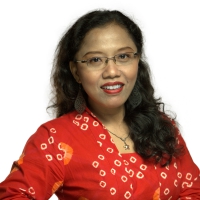.
This article is re-published from The Conversation Indonesia (TCID)
.
More than 100,000 new international students will enrol in higher education courses in Australia this year. Indonesians make up the fourth-largest group with more than 22,000 students. Many of them will begin study in the new academic year this month.
Some will travel here independently. Others will be accompanied by their families. With the absence of family support and affordable child care, female Indonesian students who bring their husbands and children experience different challenges from students coming on their own.
Temporary migrating couples from Indonesia face rapid and vast shifts in gender roles in their relationships. Husbands whose legal status is limited to dependency visas may find themselves unable to engage in their chosen profession, leading to the (re)construction of their identity as a man, a husband and a father.
Change of roles
Indonesian couples from middle-class backgrounds typically have considerable and affordable support for child care and household management at home. These external support services are either non-existent in Australia (such as the lack of geographically close family members) or too expensive for students to employ. Couples often have to alter their typical arrangements to manage child care and domestic work while in Australia.
In the beginning of their studies, the bulk of child care and household chores is usually in the hands of the female students, who are studying full-time. But, in time, to ensure the wife succeeds in her studies, couples usually negotiate their roles and specific tasks in the management of the household, challenging traditional notions of women and men.
For example, when 38-year-old Indrawan moved with his two and a half-year-old son to Australia to be with his wife, Nuraini, 30, his role as the family’s breadwinner was shaken.
Indrawan left his consultancy job with an international NGO, hoping to find work with an NGO in Australia. Despite having high qualifications, he was unable to find work given his limited visa status. He eventually worked in different shops and restaurants full-time, leaving most of the child care and household chores to his wife.
The double workload took a toll on Nuraini. She hurt her waist from carrying her son and heavy books and had to take a three-day bed rest. She finally asked Indrawan to reduce his work shifts to three days a week to take care of the children and their household. She said:
He was willing to listen to me. I was strong when I made my point because I was already too exhausted. I only needed to say it once … He really did reduce his shifts.
Domestic chores and child care were also Lisayani’s responsibilities during her Masters and PhD studies in Australia. Her husband and son followed her to Australia. Despite her busy schedule and her struggle to adapt to the university life, she took on household chores.
Lisayani said she was constructed to be a “good wife”, which traditionally entails being responsible for domestic chores. Being a “good wife” got in the way of being a good student. She almost always fell asleep while studying in the library. When her assignment results suffered, she decided to talk to her husband about her situation.
Her husband responded very well when she shared her feelings. He agreed then to do domestic chores, except for cooking and ironing. He took care of their baby when her wife was at the university. He also took on less casual jobs.
Of her husband, Lisayani said:
He was a product of a cultural construction that said that domestic tasks were not his job; he did not learn to do it then.
Challenge to traditional gender notions
Ideas of womanhood and manhood are deeply shaped by cultural and state discourses.
Indonesia’s 1974 Marriage Law defines a husband as “the head of the family” who will “provide all necessities of life required in a family”. A wife, according to the law, is a “housewife” who “shall manage the household to the best of her ability”.
The legal definition of husband and wife and cultural discourses on gender actively shape ideas of womanhood and manhood. Indonesia has terms such as kodrat wanita that refers to the “nature” of women. Kodrat pria refers to the “nature” of men. Kodrat is generally acknowledged as the assigning of gender roles and specific tasks, destined by God.
Women are judged by their skills in managing a household. People perceive the nature of women is to be a mother and a good housewife. Furthermore, this “nature” of women suggests that a good woman is obedient, passive and gentle, as well as self-sacrificing and nurturing. Men on the other hand are judged by their capacity to take care of family finances.
Women’s rights activists have proposed changes to the Marriage Law to reflect gender equality as well as religious freedom. They propose changes for:
- Article 31 (3): The husband and wife shall each have a role and responsibility in the same household.
- Article 34 (1): Husbands and wives ought to protect and provide every necessity of home life according to his/her ability.
- Article 34 (2): The husband and wife shall manage the household to the best of his/her ability.
The proposed changes also include religious freedom, particularly articles that require spouses to share the same religion.
Shifting identities
Globalisation and educational mobility have opened more possibilities for Indonesian women to continue higher education. The Australia Awards Scholarships, formally known as Australian Development Scholarships, for instance, encourage women to pursue further education. Cross-cultural encounters, such as those experienced when studying abroad, often precipitate changes in gendered roles and expectations.
For temporarily migrating couples the shift in identities may potentially occur twice. First when they live overseas. Second once they return to their home countries. As the migration is temporary, such (re)construction may or may not preserve negotiated gender roles that the couple agreed on during their stay abroad. Some values may be preserved. Some may be lost.
Lisayani and her husband seem to keep them. When Lisayani received her PhD scholarship, her husband left his job as a lecturer at a private university in Jakarta to support Lisayani’s career and study. Lisayani is now teaching at a university in Bandung, Indonesia, and her husband takes care of the house while working on a small leasing business.
For Indrawan, his household responsibilities are only temporary. In Australia, he and Nuraini took turns in taking care of their son and doing house chores based on who was available. But Indrawan said he would never consider continuing their new identities upon returning to Indonesia.
We knew it would not work in Indonesia. Everything is different here.
Tensions in the domestic sphere can negatively impact student’s performance, both academically and personally. Some kind of support also needs to be provided to spouses of international students. This may include a different scholarship scheme, or support in developing new professional networks.




